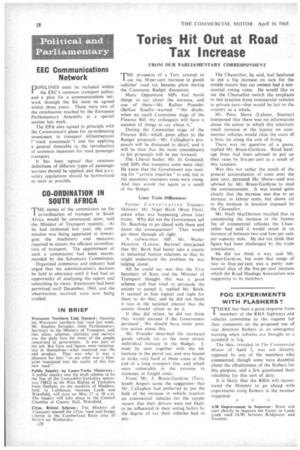Tories Hit Out at Road Tax Increase
Page 30

If you've noticed an error in this article please click here to report it so we can fix it.
FROM OUR PARLIAMENTARY CORRESPONDENT
THEprospects of a Tory attempt to cut the 50 per cent increase in goods vehicles' road tax became plain during the Commons Budget discussion.
Many Opposition MPs had harsh things to say about the increase, and one of them—Mr. Rafton Pounder (Belfast South)—warned: "No doubt, when we reach Committee stage of the Finance Bill, my colleagues will have a number of things to say about it."
During the Committee stage of the Finance Bill—which gives effect to the Budget proposals—Mr. Callaghan's proposals will be discussed in detail, and it will be then that the main amendments to his proposals will be put forward.
The Liberal leader, Mr. Jo Grimond, told MPs that transport costs were vital. He knew that the Government was waiting for "certain inquiries" to end, but in the meantime transport costs were rising. And they would rise again as a result of the Budget.
Liner Train Differences Former Conservative Treasury Minister. Mr. Nigel Birch (West flint), asked what was happening about liner trains. Why did not the Government tell Dr. Beeching to go ahead with them and damn the consequences? They would get them through all right.
A railwayman MP, Mr. Walter. Monslow (Labour, Barrow) interjected that Mr. Birch had better take a course in industrial human relations so that he might understand the problem he was talking about.
All he could say was that the First Secretary of State and the Minister of Transport thought this was a good scheme and had tried to persuade the unions to accept it, replied Mr, Birch. It seemed to him logical and right for them to do that, and he did not think it was in the national interest that the unions should refuse to do it.
If they did refuse, he did not think they would succeed if the Government persisted.. We should have some positive action about this.
Mr. Pounder described the increased goods vehicle tax as the most severe individual increase in the Budget. It must be seen together with the 6d, increase in the petrol tax, and was bound to strike very hard at those areas at the end of a long transport line, and which were vulnerable in the extreme to increases in freight costs.
From Mr. J. Bruce-Gardyne (Tory, South Angus) came the suggestion that Mr. Callaghan had preferred to put the bulk of the increase in vehicle taxation on commercial vehicles for the simple reason that their drivers were not likely to be influenced in their voting habits by the degree of tax their vehicles had to pay.
The Chancellor, he said, had hesitated to put a big increase on cars for the simple reason that car owners had a substantial voting voice. He would like to see the Chancellor switch the emphasis in this taxation from commercial vehicles to private cars—that would be fair to the country as a whole.
Mr. Peter Shore (Labour, Stepney) interposed that there was no information about the extent to which this relatively small increase in the licence on commercial vehicles would raise the costs of a firm, let along the cost of living.
There was no question of a guess, replied Mr. Bruce-Gardyne. Road haulage firms had been advised to put up their rates by five per cent as a result of this taxation, Was this not rather the result of the general accumulation of costs over the past year, persisted Mr. Shore—and was advised by Mr. Bruce-Gardyne to read the announcement. It was stated quite clearly that the increase was due to an increase in labour costs, but above all to the increase in taxation imposed by the Chancellor.
Mr. Niall MacDerrnot recalled that in announcing the increase in the licence fee of commercial vehicles the Chancellor had said it would result in an increase of between two and four per cent per capacity mile. He did not think that figure had been challenged by the trade associations.
He did not think it was, said Mr. Bruce-Gardyne, but even that range of two to four per cent was a pretty substantial slice of the five per cent increase which the Road Haulage Association was suggesting to its members.




















































































































